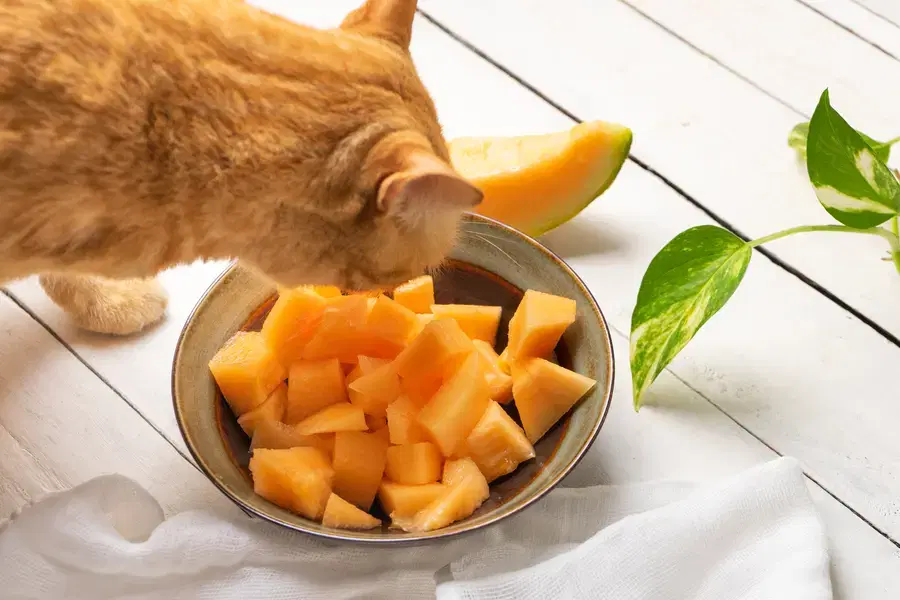Can Cats Eat Cantaloupe?
Summer is here and you're indulging your sweet tooth in a piece of fresh, juicy cantaloupe. But you realize you're not the only one trying to get a bite - your kitty cat wants some of what you're having (as usual!). Now as a paw parent, you're concerned - a bunch of what-ifs flood your mind! What if my fur baby falls sick? Can I really feed this fruit to my cat? I feel bad eating alone, should I at least let him have just a little piece?
Well, it's totally normal to have these kinds of doubts and concerns, whether you're new at this paw-parenting thing or whether you're a veteran at it! We all want to be the best caregivers for our adorable little pets and so it's natural that we tend to have a lot of questions! Let's answer some of those!
Are Cantaloupes Safe for Cats?
As a rule of thumb, most melons tend to be okay for cats to nibble on.1 But as with a lot of other human foods, moderation definitely is key. If you're going to be introducing a new food to your kitty, then it's crucial for your vet to know about it so that any health concerns can be addressed and potentially prevented! Your vet usually knows your kitty’s medical history best, so it's essential to keep your doctor in the loop. Moreover, it's so important to check for any allergies that your cat might have while introducing new foods - so make sure that you give your kitty only a small bite or two and then gauge for any usual signs or reactions such as tummy upset or diarrhea.
Are Cantaloupes Healthy for Cats?
Cantaloupes are rich in dietary fiber and also have other good stuff like vitamins B6, A, and C, along with potassium and niacin. They're also quite hydrating, making them great for dehydrated pets, and they're low in calories. The good bit is, that while lots of other human foods may not provide nutrition to your feline baby, the same isn't true for cantaloupes! In fact, both you and your kitty can benefit from eating cantaloupes.1
Vitamin C and A found in this tasty fruit are particularly good for cats and can provide health benefits such as antioxidants. This means it can help boost your cat's immune system and can aid in a healthy looking coat.2 Plus, being high in fiber and water content, cantaloupes can actually help your kitty with their bowel movements by aiding in hydration and digestion!3 What's not to like?
Risks of Feeding Cantaloupes to Cats
Of course, we also have to warn you about the potential risks - although cantaloupes can be great even for your kitty, unfortunately, they are high in sugar content. Which means that they should be fed only in small quantities to your cat. Otherwise, it can mess with their metabolism and lead to extra weight gain! It's especially not good if your cat is diabetic.3 So do check in with the vet before you feed this fruit, or any other for that matter, to your kitty. Learn more about weight management for pets.
Another potential issue is the rind that cantaloupes contain, just like other melons. And just like watermelon rinds, if your cat happens to consume it, it can lead to some pretty serious gastrointestinal issues as they are difficult for a cat to digest.3 Moreover, they could become a choking hazard for your kitty. The same goes for the seeds too! If your cat swallows some seeds, then it can easily turn into an ordeal for both you and your pet.
Also, do not let them lick the outer surface of the fruit - for no other reason than the fact that it could be full of pesticides that you don't want your little buddy to consume. So, beware!
How to Feed Cantaloupe to My Cat?
Let your cat have a taste of it and see if they enjoy it. Your kitty may have a different preference; it's okay to let them choose what they want to eat - of course, while being mindful of what foods are safe for them. If your cat enjoys cantaloupes and it doesn't cause them any trouble, feed them some! If your kitty doesn't show any interest in the food, then you can try giving them a different fruit or vegetable.
Before you give tiny pieces to your cat, also make sure that the fruit is thoroughly washed and the outer layer is scrubbed clean - to help minimize the risk of pesticides or harmful bacteria from entering your kitty's GI system.
How Much Cantaloup Can a Cat Have?
Less is more, when it comes to most human foods that you might feed to your kitty. So, a few bite-sized pieces should be just fine. Make sure that you de-seed those bites and remove the rind. Overall, if you know your cat has a sensitive tummy or has diabetes, then you might just want to skip feeding cantaloupes to your kitty altogether.
Cantaloupe should always be fed as an occasional pet treat in small amounts and not as a regular part of your cat's diet.1 It's always better to feed your cat lean meats and animal protein as opposed to fruits and veggies since they are obligate carnivores and their digestive tract is designed for meat consumption.
Remember to check for any unusual signs like lethargy, vomiting, an upset stomach, and diarrhea, and contact your vet as soon as possible if you see any signs! We know that while pet parenting is very fulfilling, it can still be a hard job - and that’s why, we at Spot want to help ensure that you have the resources available for you to be the best kitty parent you can possibly be!

I've had the privilege of immersing myself in the realm of pet safety. As the owner of an energetic mini golden doodle, I know just how stressful being a pet owner can be. I am dedicated to ensuring our beloved pets enjoy a life brimming with good health.
"Can Cats Eat Fruit?" Purina, Oct. 2, 2025, https://www.purina.com/articles/cat/feeding/can-cats-eat/fruits.
Manucy, Teresa. “Which Fruits Can Cats Eat?” PetMD, Apr. 22, 2025, https://www.petmd.com/cat/which-fruits-can-cats-eat.
"Can Cats Eat Cantaloupe?" Adventure Den, Sep. 13, 2025, https://www.adventureden.ca/can-cats-eat-cantaloupe-safety-and-benefits-explained/.
The information presented in this article is for educational and informational purposes only and does not constitute or substitute for the advice of your veterinarian.












